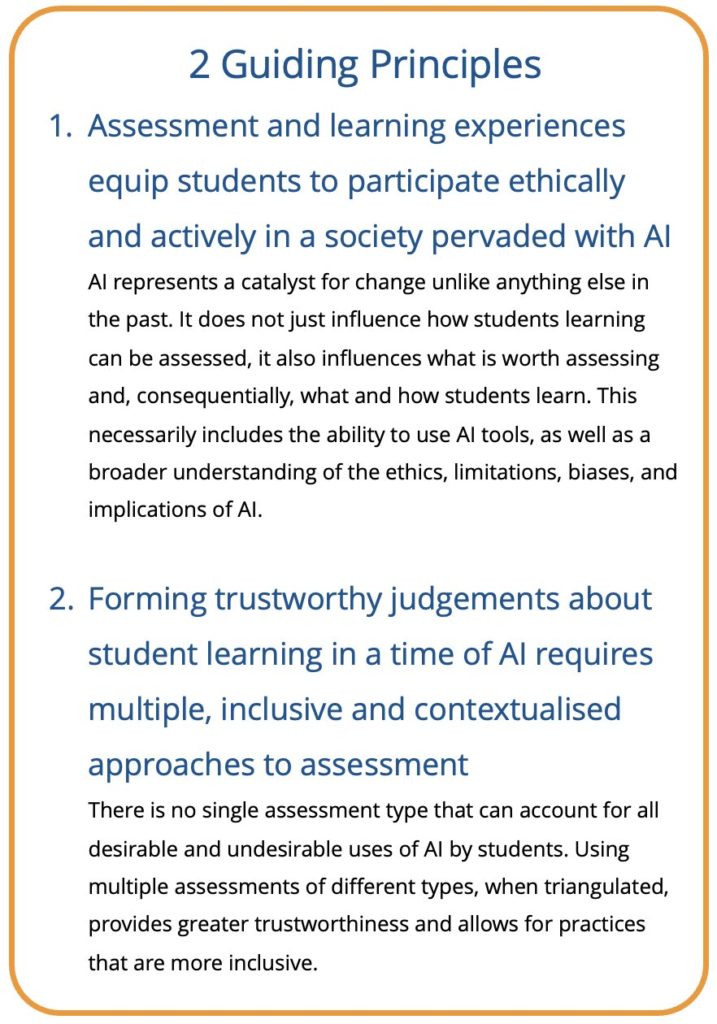“This is our Kodak moment”
This provocation was posed by one participant at August’s TEQSA expert forum. Over-dramatic? Not if universities lose the capacity to assure learning.
 Assessment Reform for the Age of Artificial Intelligence is a consultation report from the Tertiary Education Quality and Standards Agency (TEQSA), Australia’s independent national quality assurance and regulatory agency for higher education. CIC’s Director Simon Buckingham Shum and IML’s Director Jan McLean had the privilege of being invited to join a TEQSA-convened group for 2 days in August, which we hosted here at UTS, to consider how the assessment landscape has been redrawn by the emergence of widely available generative AI.
Assessment Reform for the Age of Artificial Intelligence is a consultation report from the Tertiary Education Quality and Standards Agency (TEQSA), Australia’s independent national quality assurance and regulatory agency for higher education. CIC’s Director Simon Buckingham Shum and IML’s Director Jan McLean had the privilege of being invited to join a TEQSA-convened group for 2 days in August, which we hosted here at UTS, to consider how the assessment landscape has been redrawn by the emergence of widely available generative AI.
“The emergence of generative artificial intelligence (AI), while creating new possibilities for learning and teaching, has exacerbated existing assessment challenges within higher education. However, there is considerable expertise, based on evidence, theory and practice, about how to design assessment for a digital world, which includes artificial intelligence. AI is not new, after all. This document, constructed through expert collaboration, draws on this body of knowledge and outlines directions for the future of assessment. It seeks to provide guidance for the sector on ways assessment practices can take advantage of the opportunities, and manage the risks, of AI, specifically generative AI.”
 As the report explains in setting the scene, the point of departure is a 2010 report entitled Assessment 2020: Seven Propositions for Assessment Reform in Higher Education, on which this new report is modelled [website/report]…
As the report explains in setting the scene, the point of departure is a 2010 report entitled Assessment 2020: Seven Propositions for Assessment Reform in Higher Education, on which this new report is modelled [website/report]…
“We take our starting point for this document from the propositions for assessment outlined in Assessment 2020 (Boud and Associates, 2010). This work outlines how assessment acts as a powerful intervention in student learning and highlights the educational purposes of assessment in parallel with the process of assuring learning outcomes. Good assessment design that allows for ‘rich portrayals’ of student learning is critical. Thus, we take as given that assessment should engage students in learning, provide a partnership between teachers and students, and promote student participation in feedback. These key elements of assessment can then guide how best to consider the role of AI in assessment design.”
The question is — how does AI change things? We propose two propositions and five principles:
The lead team presented the report in this TEQSA webinar, which was the latest in a GenAI series co-hosted with Deakin University’s Centre for Research in Assessment and Digital Learning, woth contributions from both Simon Knight and Simon Buckingham Shum. The report was then presented and discussed at the TEQSA 2023 conference.
It was fantastic working with such outstanding colleagues, and special thanks to the team who designed and facilitated the expert forum: Jason M. Lodge, The University of Queensland Sarah Howard, University of Wollongong Margaret Bearman, Phillip Dawson, Deakin University
With Shirley Agostinho, University of Wollongong, Simon Buckingham Shum, University of Technology Sydney, Chris Deneen, University of South Australia, Cath Ellis, The University of Sydney, Tim Fawns, Monash University, Helen Gniel, TEQSA, Rowena Harper, Edith Cowan University, Michael Henderson, Monash University, Danny Liu, The University of Sydney, Lina Markauskaite, The University of Sydney, Jan McLean, University of Technology Sydney, Carlo Perrotta, The University of Melbourne, Lambert Schuwirth, Flinders University, Christine Slade, The University of Queensland

